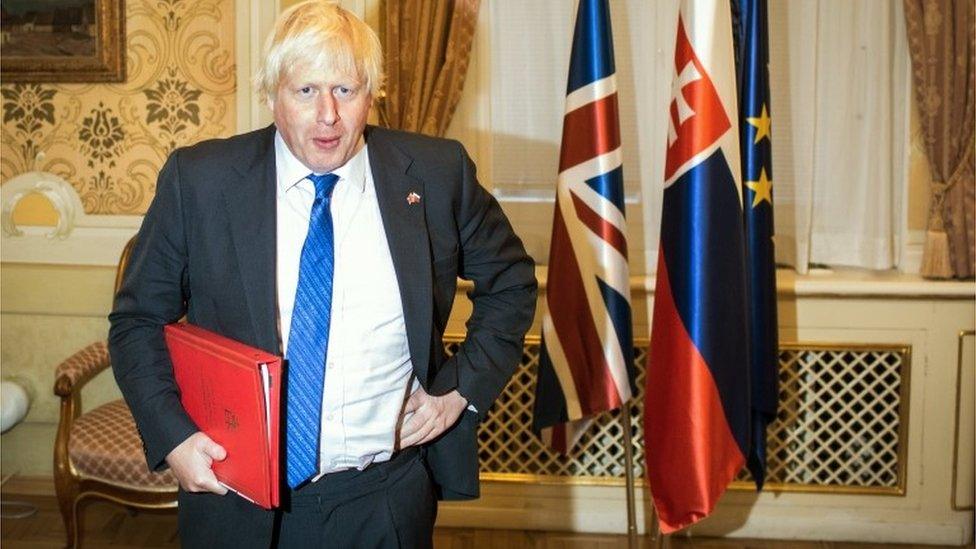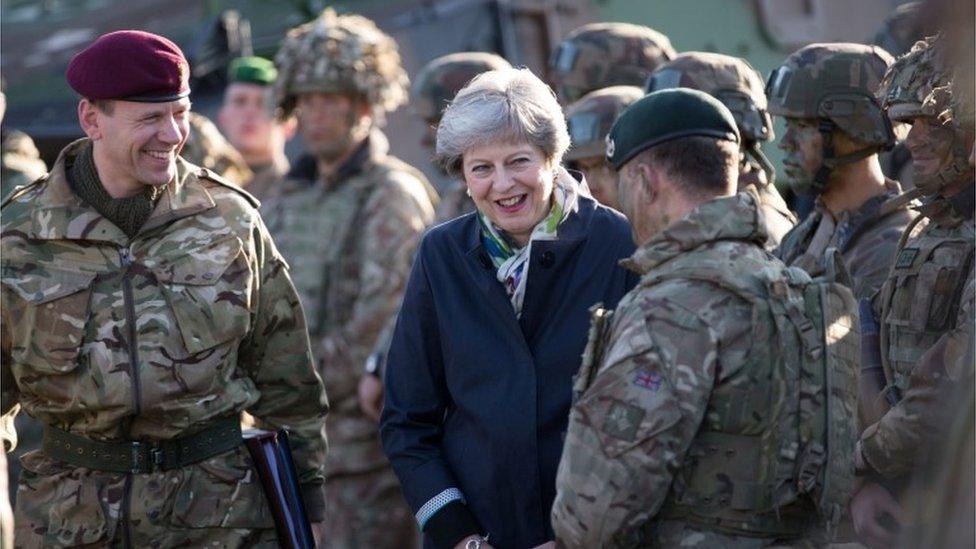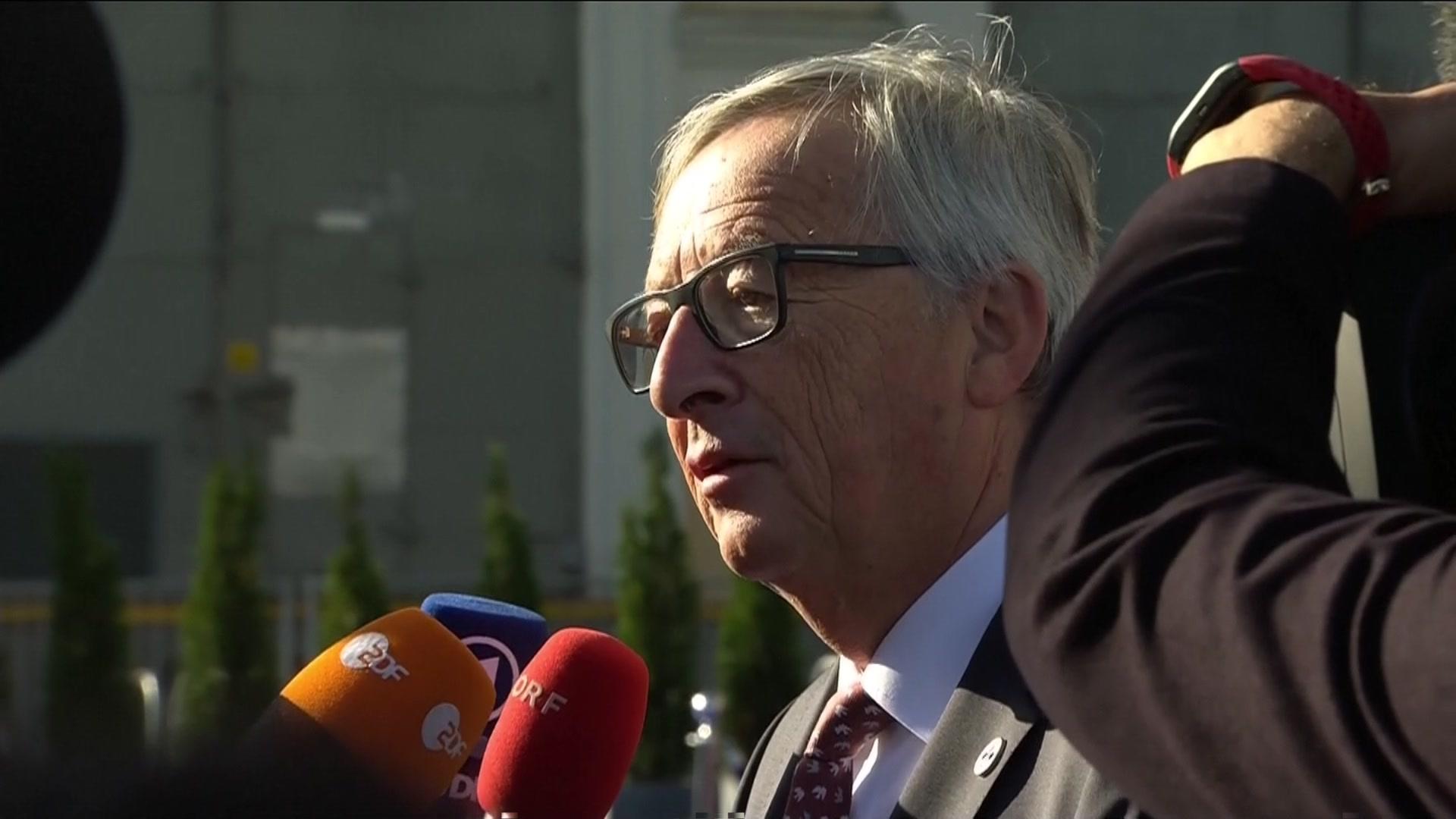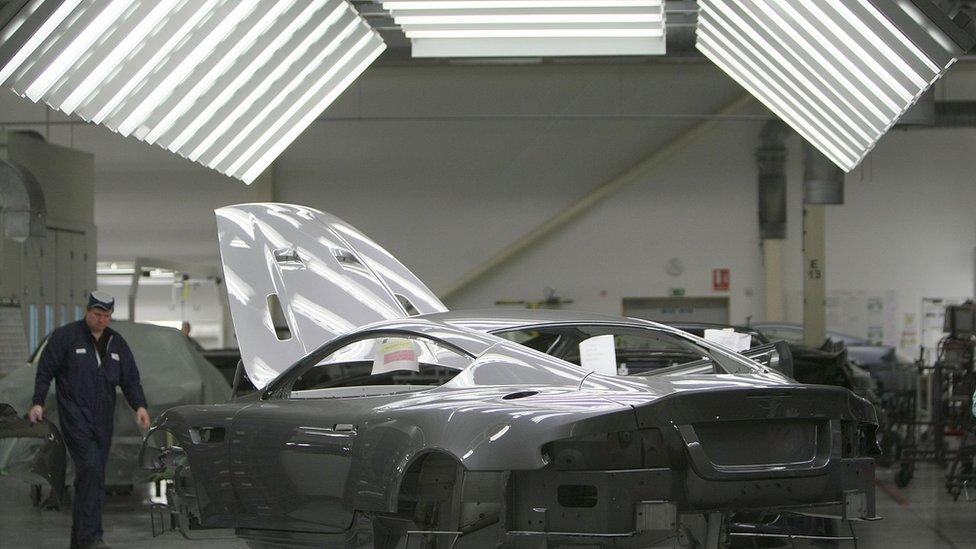Brexit: Boris Johnson urges two-year transition time limit
- Published

Theresa May is coming under fresh pressure over Brexit on the eve of the Conservative party conference.
Foreign Secretary Boris Johnson has again intervened on Brexit, setting out four conditions he says are necessary.
Speaking to the Sun, external, Mr Johnson insisted any transition period after Britain leaves the EU should not last "a second more" than two years.
Jeremy Corbyn said Mr Johnson's position threatened a trade war with the EU, which could impact on jobs.
The prime minister will be seeking to reassert her authority as she goes into her first party conference since she lost her government's majority in the general election.
It also comes after six months of Brexit negotiations in which there has been no significant breakthrough.
BBC political correspondent Jonathan Blake says Mrs May must take the agenda back to her priority: the economy.
Our correspondent says the timing of Mr Johnson's latest comments was "no accident", coming as Conservatives gather in Manchester for their annual conference, which starts on Sunday.
In his interview with the Sun, Mr Johnson called for four conditions for Brexit, which were then described by the paper as his "four red lines":
Transition period must be a maximum of two years
UK must refuse to accept new EU rules during that period
No payments for access to the single market after the end of the transition period
UK must not agree to shadow EU rules to gain access to the single market
Mr Johnson said: "The crucial thing I want to get over to Sun readers about Brexit is that it is going to be great and we need to believe in ourselves and believe we can do it. It is unstoppable."
He also touched on other subjects in the interview - calling for a faster increase in the minimum wage and for public sector pay rises.
While he dismissed suggestions of any leadership ambitions, his comments are likely to fuel speculation that he is still positioning himself for the top job.
Lib Dem leader Sir Vince Cable said the foreign secretary's comments sent a signal to EU negotiators that the "strings were being pulled by others".
"Senior Conservatives are displaying an abject failure to act together in the national interest and seem more motivated by selfish, personal ambition."
However, Transport Secretary Chris Grayling said the government was determined to deliver the "best possible outcome for Britain".
"What you're hearing from leading Conservatives, in my view, is simply that commitment," he said.

Analysis: From expectation to reality
By Chris Mason, BBC political correspondent in Manchester
As Conservative activists begin to flood the Mancunian streets, their mood will be set by the gap between previous expectation and contemporary reality.
The anticipated leap forward to a greater majority at the election; the truth, a humiliating reverse - an emotional defeat despite a mathematical victory of sorts.
And, for a contrite prime minister, confronting the party faithful for the first time since the result, it's a second weekend this month where her foreign secretary has upstaged her.
Theresa May has acknowledged to party members the election outcome was "disappointing" and will strive to ensure the debate about Brexit doesn't drown out an opportunity to be heard discussing domestic priorities.
Meanwhile Labour leader Jeremy Corbyn, forever keen to illustrate his upbeat party is on a permanent election footing, spent the day campaigning in marginal Thurrock, in Essex.

Meanwhile, the Scottish Conservative leader Ruth Davidson has attacked the "over-optimism" of Brexiteers telling the Times, external that it "sells people short".
Mr Johnson's interview comes just a week after Mrs May's major speech on Brexit in Florence and is the second recent intervention by her cabinet minister.
He previously outlined his "vision" in an article for the Daily Telegraph, which prompted Mrs May to say: "This government is driven from the front."

Theresa May, pictured meeting Nato troops in Estonia on Friday, wants to make Britain fairer for the young
Mrs May said that, while she was focused on getting the best deal with the EU, she was also committed to making Britain fairer - in particular for the younger generation.
"I understand the concerns raised, particularly by young people," she said.
"My determination to act on those concerns, and crucially, to fulfil the promise of my first speech on the steps of Downing Street, is greater than ever."
The call from Mr Johnson comes as other Eurosceptic Tory MPs have said the UK should walk away from Brexit talks by Christmas unless the EU shows it is serious about a free trade deal.
The Leave Means Leave campaign has urged Mrs May to speed up talks with the EU.
The group - which includes ex-minister Owen Paterson - said the prime minister should not be afraid of a "no deal" scenario.
In a letter to Mrs May, they say: "To delay the end of the transition period until after the projected 2022 general election could jeopardise the entire Brexit programme."
Mrs May must make clear that British courts must no longer be bound by European Court of Justice rulings after the moment of withdrawal and that the UK will be free to negotiate, sign and implement trade deals with other countries during the transitional phase, the group argues.
- Published29 September 2017

- Published28 September 2017
